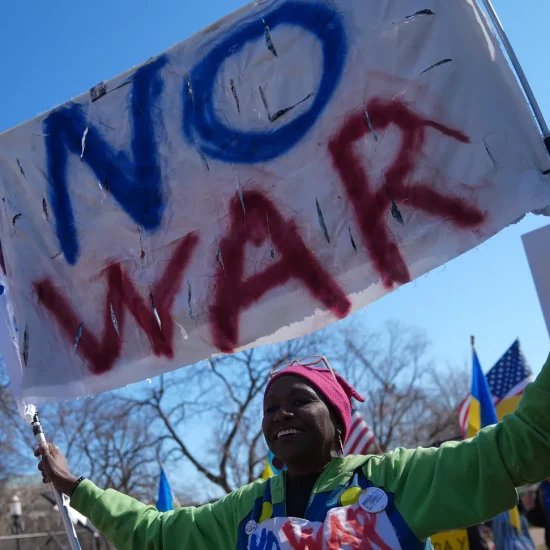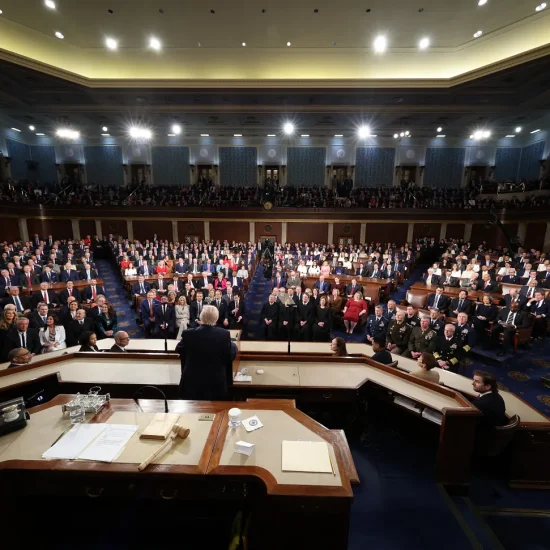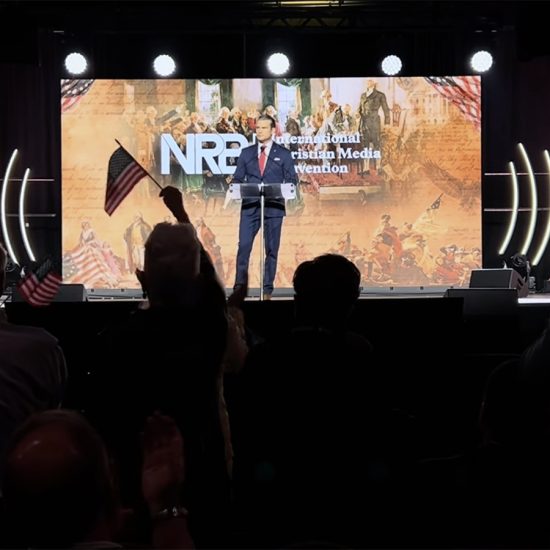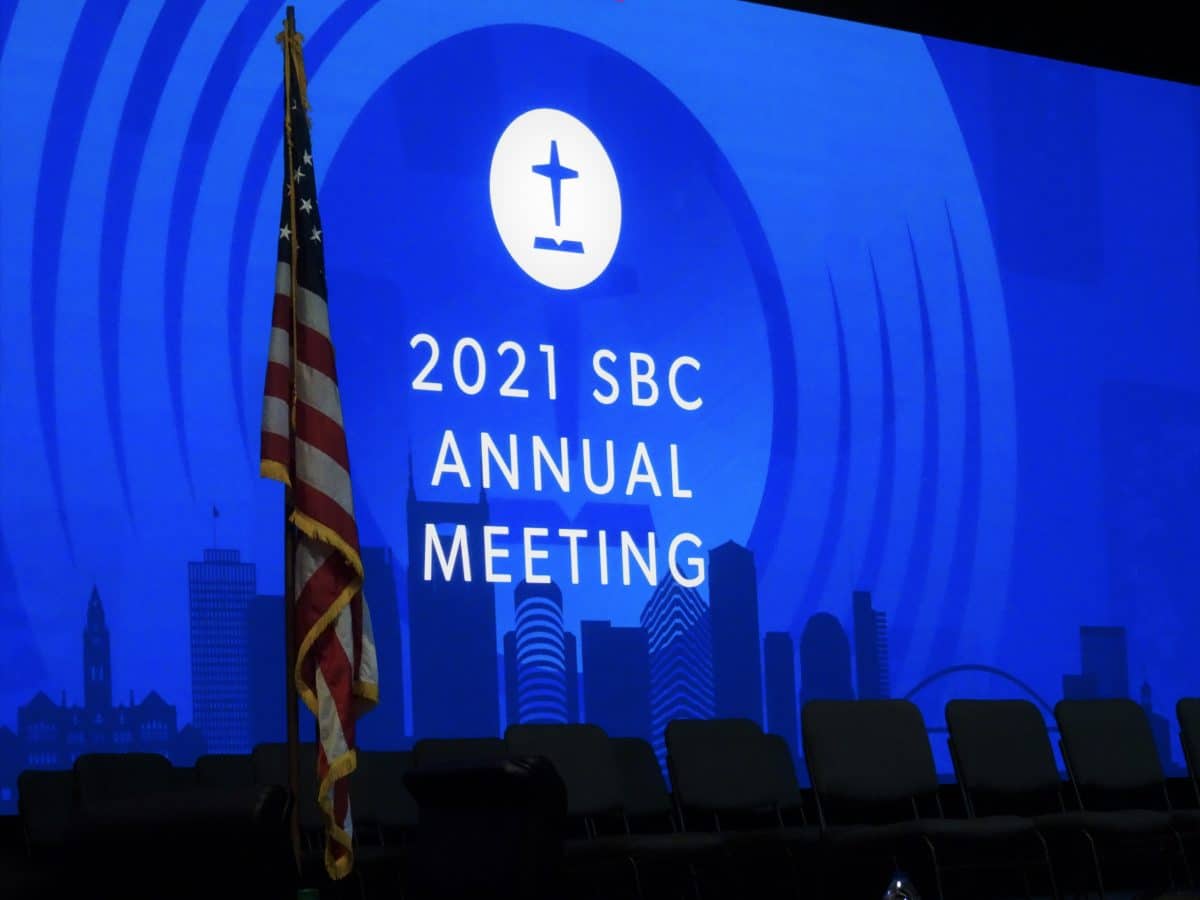
As Southern Baptists gathered Tuesday (June 15) in Nashville, Tennessee, the stage was set for tensions between American and Christian loyalties.
Literally.
Preachers on the stage stood between U.S. and Christian flags, and mostly talked about the Gospel to the crowd of more than 15,000 messengers. But sometimes the banner on the other side received more attention. And a resolution on “Christian citizenship” to explain that middle ground was dropped.
Following the tradition of past years, the annual meeting included a session at the start on “celebrating freedom” that featured American iconography and remarks by military chaplains. Outgoing SBC President J.D. Greear introduced the time “to celebrate the freedom that God has given to us as a country.” Mentioning that the apostle Paul wrote in 1 Timothy 2 that Christians should pray for kings and other in authority so that Christians can live out their faith in “peace,” he added that in many ways the chaplains “have been God’s answer to that prayer.”
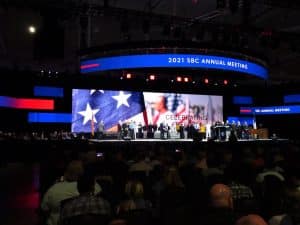
“Celebrating Freedom” time during the Southern Baptist Convention meeting in Nashville, Tennessee, on June 15, 2021. (Brian Kaylor/Word&Way)
Chaplain Major General Doug Carver, executive director of chaplaincy for the SBC’s North American Mission Board, quoted a speech by Ronald Reagan about the importance of a nation fighting for freedom and from a stanza of the patriotic song “My Country ‘Tis of Thee” about “freedom’s holy light.”
“Jesus Christ is the source of freedom’s holy light, and, by the grace of God, freedom’s holy light still burns brightly in America,” Carver added. “Today, we honor our soldiers, sailors, airmen, Marines, Coast Guardsmen, veterans who for the past 246 years have fought for, fueled, and preserved freedom’s holy light with their blood, sweat, and tears. Our troops have always answered the nation’s call as guardians of freedom’s holy light.”
Carver linked this merging of religious and national freedoms to the founding of the U.S.
“This message was burned into the hearts of our nation’s founders 245 years ago in their recognition that our freedom as a nation and the freedom of any nation is a God-given gift,” he said. “Praise the Lord that today preachers across our nation still have the freedom to proclaim the simple message that Jesus Christ is Lord. And may we always remember that where the Spirit of the Lord is, there is true liberty.”
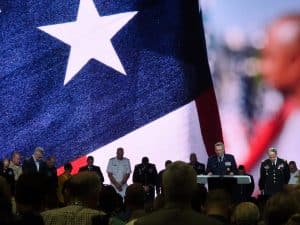
“Celebrating Freedom” time during the Southern Baptist Convention meeting in Nashville, Tennessee, on June 15, 2021. (Brian Kaylor/Word&Way)
Later in the morning, Greear also touched on patriotic issues during his president’s address as he urged messengers to focus on the Gospel above other commitments, including political ones. He expressed his belief in American exceptionalism even as he warned against engaging too much in U.S. political fights.
“I love America. Oh, my kids have endured countless lectures about America’s uniqueness. I still get teary eyed whenever I hear our National Anthem,” he said. “I recognize that the blessings that God has bestowed on our country should never for one second be taken for granted. But hear me: God has not called us primarily to save America politically; he has called us to make the Gospel known to all.”
“I love America, but God has not called me primarily to save America politically,” Greear added. “He’s called me to preach the Gospel to save Americans eternally. Red ones and blue ones and purple ones. Red, yellow, black, and white, as I sang in Sunday school, they’re all precious in his sight.”
Greear struck a stronger note on not aligning with one U.S. political party.
“We’re not the party of the elephant or the donkey. We’re the people of the lamb,” he argued. “When we make our political calculus synonymous with Gospel faithfulness, we do a disservice to the Body of Christ and the Great Commission.”
“Whenever the Church gets in bed with politics, the Church gets pregnant. And the offspring does not look like our Father in heaven,” he added.
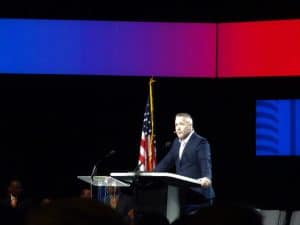
J.D. Greear speaks during the Southern Baptist Convention meeting in Nashville, Tennessee, on June 15, 2021. (Brian Kaylor/Word&Way)
An opportunity to take a stand against one political ideology that elevates national pride over the Gospel was aborted at the last minute. The SBC’s Resolutions Committee proposed, printed, and distributed 10 resolutions for messengers to consider. Resolution 7 addressed “Christian citizenship.”
Citing biblical passages in Romans 13, 1 Timothy 2, and 1 Peter 2, the proposed resolution called on Southern Baptists to “pray for our governmental leaders” and “affirm the ultimate Lordship of Jesus Christ over every earthly kingdom.” It would have also had Southern Baptists “affirm the supremacy of our gospel witness above partisan politics, rejecting every idolatrous expression of love for our country as inconsistent with our ultimate loyalty to Christ and his kingdom.”
Then the proposed resolution addressed the insurrection on the U.S. Capitol on Jan. 6, when a pro-Trump mob carried Christian flags and other Christian symbols alongside Trump, Confederate, and U.S. flags in an effort to violently support the failed candidacy of Trump. Many scholars and commentators since Jan. 6 have talked about Christian Nationalism in the crowd that day, though that phrase was not in the proposed SBC resolution.
“We oppose any and all efforts to promote any political candidate, party, or platform through coercion, suppression, misinformation, or violence, especially when undertaken by professing believers in the name of God,” the proposed resolution read. “We denounce the Capitol insurrection of January 6, 2021, and the resulting tragic loss of five lives, including a Capitol police officer, as inconsistent with faithful Christian citizenship.”
However, the Resolutions Committee pulled Resolution 7 without any debate or vote, a move that came after several publications noted the Jan. 6 line in articles about what was expected to be discussed that day at the meeting. Committee Chair James Merritt said they took this action “in the interest of time.” The messengers could have granted additional time. Or the committee could have included it in a group vote with two unrelated resolutions that were quickly passed together without debate or amendments due to the time constraints.
On Wednesday morning after this piece was first published, Merritt answered a question from Word&Way about the dropped resolution in a Resolutions Committee press conference. Merritt said it was “our regret” they didn’t have a vote on resolution because they “wanted to get them all in.” But he added they expected a number of amendments and debate, so “we knew that it would burn so much time that we would not get to the ones that we thought that we needed to.”
About two hours before the dropping of the resolution, 21 Republican members of the U.S. House of Representatives — including three Southern Baptists — voted against awarding Congressional Gold Medals to the police officers who defended the Capitol on Jan. 6. Rep. Thomas Massie of Kentucky explained his opposition due to the legislation’s use of the word “insurrectionists.”
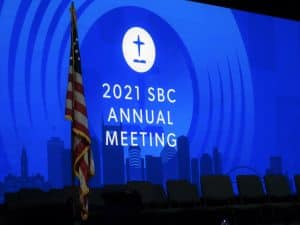
(Brian Kaylor/Word&Way)

